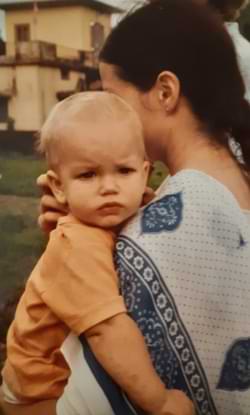
Growing up in Toronto: 1953-1973
My claim to fame was in owning a large red wagon that we, the kindergarten class, needed in order to bring back the pumpkin for the school Halloween celebration.
I also remember being in the principal’s office, to receive corporal punishment, or perhaps it was only a warning that such a thing could happen. Both seemed of equal severity.
In Class 4, I ripped my new red plaid shirt, made by my mother, when I got in a fight with Michael Kelly. I don’t remember the fight itself, only the mortification I felt about crying as a result of it. That may have been the last time I cried.
Early Learning
With seven children in the family, it is not surprising we learned how to work and take on responsibility. My mother was at the heart of that dynamic. She took on secretarial work while completing her college course in botany, all the while keeping her family a well-oiled work-machine. Everyone did household chores, but we also functioned as a little factory. The Rust-Craft truck backed up to our door every week and unloaded boxes of freshly printed cards. Our job was to assemble, glue, count, and repackage the cards, making everything ready for display in the shops. We learned faster than our neighbours how to count to 10.
Eventually, we delivered newspapers—a good reason to not to dilly-dally home from school. We got to know everyone in the district when we made our collections at the end of the month.
Church
The ploughing competition was not the most spiritual church activity, but in retrospect, it was a community happening. I remember it well because it was such a singular event. All the city church folk played “farmer,” with food at the centre of all activities.
One night a week, J.W. Sefton gathered us pre-teens together for floor hockey at the church. I have no recollection of learning any skills, but enjoyed the games.
Every year we camped in the forest and played capture the flag. One year, I went up a day earlier to get things set up. In the afternoon I took the canoe out by myself, without a life-jacket to enjoy a short ride. The wind began picking up so I decided to head back. While manoeuvring the canoe, I was dumped into the freezing cold water. Pushing the swamped canoe ahead of me, I swam for the island in the middle of the lake. Relieved to be on land again, I flipped the canoe over and warmed myself in the sun. Later, I headed back to the campsite, seemingly without anyone noticing my absence. I wondered, had anyone really missed me?
I am not sure why, but I was elected to be in charge of the spiritual aspect of the youth group. I penned some questions we had about God and the church. Then, with two others, we put the questions to the minister. His answers were disappointedly poor in content. We felt our thirteen-year-old selves deserved to be treated more intelligently, even if it meant rescheduling to allow the minister time for research. That put a clear stop to my being in charge of “spiritual stuff.” It was also the last time I went to church for many years.
Sport
My baseball team was the Joe Charish City Service (named after the petrol pump). That is, it was my team until it was clear to everyone I couldn’t catch or hit the ball. Much to everyone’s relief I was found to be good at absconding.
Diving classes must have been someone else’s idea as I surely didn’t sign up on my own accord. I did, however, gain distinction as the only one able to hit his head on the bottom of the diving board before sinking to the bottom of the deep end.
Cross country running was my passion. It allowed me to participate in sports without the peer pressure that comes with being part of a team. I particularly enjoyed the opportunity to go out into the country for competitions.
On summer nights, street hockey was popular. There was no shortage of boys in the neighbourhood, and we played every night. The matches finished early enough for us to play Nicky-Nicky-Nine-Doors. We would run around banging on the neighbour’s doors, and then run away. The Smith’s and the Lankan’s got the most annoyed, so we gave them more attention.
High jumping was a serious sport for my 3 older brothers. It was played by vaulting over the hedges between the neighbourhood houses. My brothers were famous for winning; however, our mother got an earful of complaints from Mr. Alain. Never discouraged, my brother Ted elevated the sport by setting up a pole-vaulting pit behind the house.
Joining the Workforce
I joined my neighbour, Michael, in trying out a better way for an eleven-year-old to earn some money. Because delivering newspapers was not fun during sub-zero temperatures, Michael showed me the ropes at Silverwood Dairy. We arrived at 6 in the morning, and for the first few weeks, Mom got up and made me eggs and a thermos of coffee to take with me. Arriving at the dairy, we hung around asking the drivers if they wanted a helper for the day. Helping meant going with a driver in his truck, running up to the house and depositing milk bottles into the box. We returned with the empties and the tickets. This earned me two dollars a day. A good driver might give you three. I was lucky to have had a number of decent drivers. Apart from earning a daily wage, I also learned my 28 times-table according to the price of a quart of milk. I can’t say that I have used that particular skill since then. Working on the trucks made for an interesting bunch of drivers giving me an interesting bunch of advice—and habits. Some good, some not to be used outside the job.
The variety of routes used by the trucks opened up my world. My confidence began to expand. In my second year of Saturdays on the trucks, I was fortunate to work for Jim Barker, who was a decent guy and paid me 5 dollars. I worked with him for nearly a year. It was great to have a regular driver rather than having to search out a new one every time. We shared a friendship and mutual respect.
In the summer, I worked 5 days a week. I was excited when Jim invited me to join his family at their cottage on June 23, 1966. I remember the date, just 3 days before my birthday. I’d be with Jim for my birthday. We planned to do the regular delivery route, then drive to the cottage for the week. I arrived at the usual pick-up spot and waited till way past the time set. After a long two hours I returned home, unable to think why Jim hadn’t shown up for the special trip.
It was at the breakfast table, listening to the news with my family, that we heard of Jim’s death. Jim had been hit by another car, driven by a couple of drunk boys. I stopped breathing as my brain struggled to comprehend the impossibility of what I’d just heard. Knowing no one would understand my grief, I processed the tragedy by myself. I attended his funeral, standing at the back of the big Catholic church. I wanted to meet his family, and see his face one last time, but left without doing either. It was a loss I was not prepared for. Nor did I heal afterwards. I never returned to the dairy.
Being thirteen-years-old is a bit of a drawback if you want to get an honest job. My brothers had jobs working in the cinema hall, the grocery shops, and fast-food places. I went to about twelve businesses before I was hired at the Dairy Queen. Minimum wage was 85 cents and all you can eat! What more could I ask!
Among the younger of us were four older employees, one who took it upon herself to ridicule and abuse the younger ones. Because I didn’t smoke, she called me names and bullied me to the point that I finally took the time to learn. I hid behind the bushes, puffing and coughing for a week. When I returned, I was ready to prove my manliness. It solved nothing. What took a week to learn, took 10 years to leave!
It was the manageress who gave young kids like me their first job. Over a period of three years, she taught me everything from cleaning and cooking, to running the cash machine and balancing the books. I did crazy shifts, getting home at 2:00 in the morning, after a final coffee with the gang at Mister Donut. My job filled my life and began to feel like family.
My life was changing in subtle ways. I hung out with older people who cruised Yonge Street after work. We watched all night movies, and tried different ways of being cool. The pressure I felt to be part of the gang was paramount.
My working hours didn’t coincide with my education, so I fit school in when convenient. Reaching 16 gave me some freedom to do what I wanted, like moving out of the family home and into a commune in the heart of the city. After some time, on an urge, I left for the west coast—easy drugs and California hippies. After a few months, I phoned my mother. She was shocked, and not too happy, completely unaware that I wasn’t in Toronto. I still had that lingering feeling of never being missed.
Reaching the Top
By the time I was 18, I was back, working for Mr. Mac, the richest man in Toronto. He indulged in luxuries; expensive cars, houses, land—whatever he fancied. I managed one of his fast-food restaurants. One of the house specialties was a Bobo. The trick in selling a Bobo was being able to explain a Bobo fast, like it was one word—”Bobo is a spicy chicken meat ball deep fried in an egg-batter and dipped in plum sauce”. The tongue twister aroused the curiosity of the customer, and they’d place an order.
While working with Mr. Mac, I spent a lot of time listening to his problems; women problems, wife problems, alcohol problems, lack of sincere friends. He knew his “friends” were after his money—and this hit home—because I, too, was a friend because of his money. Mr. Mac’s wealth brought him no happiness. And the more time I spent with him, the clearer it became that my ambition to become the richest man in the world at the youngest age, was not going to make me happy.
By 1971, school was nearly finished, or more accurately, I was finished with school. Instead, I embarked with my best friend, Tim, on a trip through Europe. My plan was to end the trip in Fiji. There, a job managing one of Mr. Mac’s many restaurants awaited me.
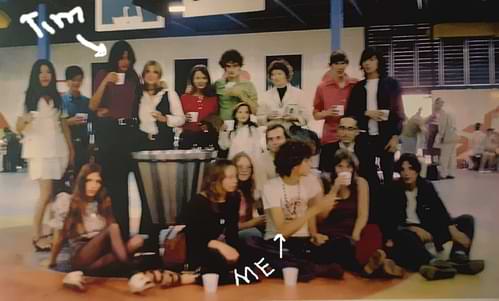
Europe
Outside of Amsterdam, Tim and I realized we needed to take a break from each other. Tim had been playing around with his pocket knife while waiting for rides. I was annoyed. We’d never get a lift unless he put it away! We agreed to meet again in five days, in Munich, at the Octoberfest. I don’t remember who got a lift first, but my ride was a great surprise. Instead of going to Cologne, the fellow who picked me up convinced me Cologne—such a dirty city—was not worth my time. Hearing that, Salzburg became my new destination. My longest hitch in Europe was from Amsterdam to Salzburg, Austria. The driver’s suggestion of hiking in Austria would have been easier if I’d known where Austria was located. Did he mean Australia?? Why had I slept through my geography classes? Australia I could locate on the map, but Austria? Had I purchased a map, it could have opened up a whole new level of understanding!
My guide drove straight through Germany without stopping, and we arrived in a village above Salzburg that night. He arranged a “Zimmer” for me: A bed with a down quilt, cowbells to wake me in the morning, and a farmer’s breakfast. When I woke, I was amazed to look out the window and discover I was perched right above the actual movie set of The Sound of Music. For three days I walked the streets, (humming Climb Every Mountain), climbed surrounding mountains, and sampled the wares of the many cake shops. Every morning I looked forward to doing more of the same.
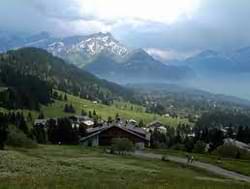
One day everyone in town was dressed in traditional costume to celebrate All Saints Day. It seemed like being zapped into the past. The huge church in the centre of town was packed with locals and tourists. Classical music resonated from within. I went in and sat down to enjoy the recorded music. Gazing at the vaulted architecture, I was stunned. This was no recorded music. Above me in the balcony sat a full orchestra. Mozart would have been proud.
Remembering my plans to meet Tim, I headed for the beer fest in Munich. Despite waiting three days, he didn’t appear as per our plan. I left a note on the Hostel board: I would be in Geneva, then Spain, then Greece by Christmas. (Long story short: when I returned to Canada 7 months later, I met up with Tim. The same day we split-up outside of Amsterdam, he went straight back to his girlfriend in Canada!)
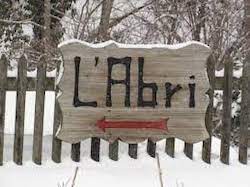
In Geneva, I met travellers going to a cool place in the Alps, with a free stay for up to 20 days. A place where people talked about amazing things. Being budget minded, and eager to be in the Alps, I changed plans for L’Abri.
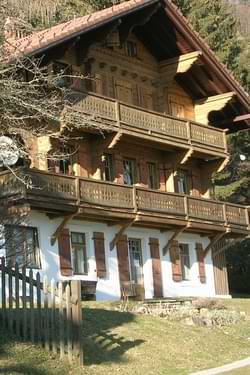
This Christian community was started by an American philosopher, Dr. Francis Schaeffer. The community focused on getting youth to re-think life questions, addressing issues of origin, morality, meaning and destiny. Bible study based on logic, philosophy, and history, and, couched in the atmosphere of a loving family environment made it truly impacting. Illuminating discussions happened throughout the day, with intellectual input from the Schaeffer’s. It was the first time since Sunday School I’d heard something from a Christian perspective that was intellectually acceptable.
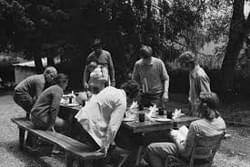
Something happened there. In 20 days, I came to a point of clarity, of accepting that there had to be a creator God… and I came to that conclusion without having to commit intellectual suicide. On the day I left, I attended a meeting. While we were all standing and singing, I noticed a boy sobbing—in joy and happiness. I realized that what I’d learned was not simply intellectual, but a sincere relationship—just as real as my intellectual understanding. As real as any math calculation or scientific equation.

Relationship had to be in the picture.
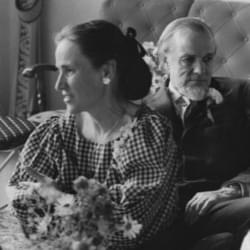
Unlike those who had applied to stay for 6-12 months of study, I did the twenty free days for “drop-ins.” Before I left, the leaders requested I escort two girls to Madrid. Lyon is as far as we got, because hitching in France isn’t as acceptable. Finally, a car pulled up. The driver wasn’t going our direction, but he invited us to stay, and have dinner with him and his wife. He promised to drop us in a good spot in the morning. He and his wife were great hosts. At dinner, over many hours, each of us shared our newly found faith with them. They also shared their faith. He, our host, was a warlock, and she, his wife, was a witch. Nevertheless, they sincerely appreciated us sharing our beliefs. Good to his word, the next morning our host took us to the train station and paid our fare to Marseille. From there we hitched to Barcelona, and eventually to Madrid.
After dropping the girls, I returned to Barcelona and slept on a bench in the harbour, wanting to catch the early morning ship to Italy. In 1971 the port in Barcelona was known to be the most dangerous one in Europe because of drug trafficking. As the saying in Hindi goes, “I sold my horse and went to sleep.” —
“अपना घोडा बेचकर मैं सो गया”
When I got to Italy, I enjoyed the relics of the Roman Empire. Then I caught a ship to Cyprus. The day I arrived a civil war broke out, and I also became “broke.” I only had seven dollars left to my name. I slept on a beach for a week, ate oranges off trees, and waited for a ship to Israel.
Bet Queshet
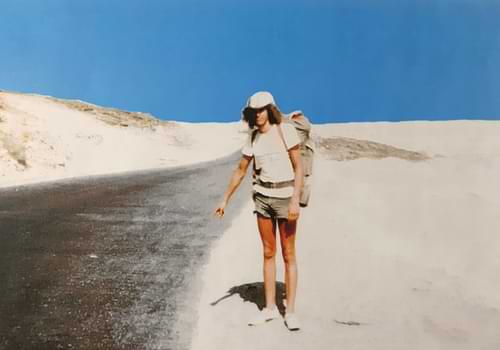
I arrived on Shabbat in early January. I was assigned to work on Kibbutz Bet Queshet, where I joined about 25 other volunteers from all over the world. I roomed with two Australian guys, both named Gary. Nearly all the volunteers were taking advantage of cheap dope, free boarding, and an easy lifestyle. We worked six hours a day for three meals a day. Every week we’d be issued a clean work pant, a shirt, underwear, and two packs of cigarettes. Everything necessary to cover our basic needs.
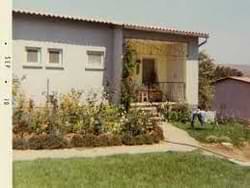
I don’t remember how I met the Ben Gera family. It must have been when I was elevated to the post of head-pot scrubber. The whole community ate in one dining room, facilitated by a large kitchen and clean up room. Pot-scrubber was the lowest rung of the ladder, but I took to it like a penguin in snow, and enjoyed it immensely. I talked constantly with people whose language I couldn’t understand at all. Asher, the man in charge, invited me to his house for sweets and a drink. Every day his family would meet at 5:00pm. All seven of his kids came.
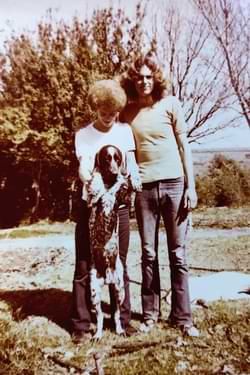
On the kibbutz, children lived in children’s houses, not with their parents, so a family hour was set aside so families could share the week’s stories, eat Mom’s cooking, laugh and goof-around together. I never could have imagined such a family environment. Tamar, the mother, was the nurse in charge of the infirmary. She was an amazing woman. She served the community wholeheartedly and cared about every individual family and volunteer.
After inviting me numerous times to share in the family hour, Asher asked me, “Why is it you don’t come unless I specifically call you? Do I have to call you every time?”
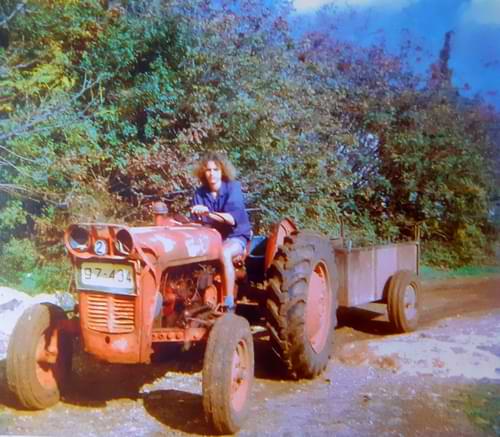
I worked in many areas, driving tractors, working the field, picking grapefruits and oranges and learned much about the philosophy of communal living. The kibbutz members certainly had their reasons for creating such Jewish communities, for nearly all of the its members were survivors of the Holocaust. I had little understanding of that. It was a locked door; something never talked about. Parents didn’t even tell their children. Memories were too painful. Most everyone had no living relatives. Unimaginable trauma was their past, but the past left them with ever-present memories.
Asher genuinely seemed to like me. We enjoyed working in the kitchen together. It surprised me that he wanted me to join the family every evening. Asher was an educated and wise man, and loved music. He was a teacher who could expound on many subjects. He had a keen interest in spiritual topics and an unusual sense of humour.
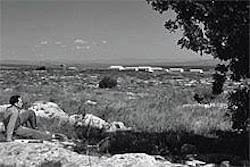
Special times with Asher included times when he totally relaxed, leaned back and shared a drink and a cigar with me. Sometimes, it overwhelmed me. He was like a father to me. I never had experienced such a relationship with my own father. We’d sit and talk openly, personally. I wish I’d asked more and listened more. I couldn’t imagine why he liked me so much.
Tamar was not only a mother to her seven, but to the three or four others who showed up for her “Schlopkus” (soggy cheese cake, her house speciality). Tamar lit the Shabbat candles, but beyond that, I have no recollection of there being any religious tradition. I don’t know how the family’s own children felt about all the extra volunteers during family time. They seemed very accepting, and graciously involved each of us in unique ways.
I’m not sure what prompted me, but after I’d been there for another 4 months, I felt like I should go home. I borrowed money from my mother to return to Toronto. I was nervous and unsure about my present relationship with my parents, so instead of returning home, I went to the commune where I used to live, and where an older brother lived.
I’d been gone for nine months. I’d experienced things I couldn’t have imagined, met remarkable people, and had amazing adventures. My life had been irrevocably altered. I was a different person from the one who left nine months ago. Now, I was left with memories.
When I walked into the commune, everyone was planted around the TV watching Star Trek. After an initial round of hellos, everyone went quiet in front of the T.V. again. I felt flat. They had no interest in what I’d experienced or how my life had changed. It was an eye-opener for me.
The next day I went to pick up the money owed to me from where I’d previously worked. The secretary informed Mr. Mac that I was there. He asked me to come into the office to talk over a business proposition. He wanted me to take over management. Because I knew the ropes, he applied pressure by offering a generous wage. So, I ended up back in the old “normal.” I worked long hours, earned money, but had no purpose. Nine months of travel had changed me, and months later, I knew I was losing what I’d gained in my travels.
In February 1973, I returned “home” — where I felt belonging and purpose. Israel. Arriving there, I sat on the bench outside the dining room, making myself obvious, waiting for Asher to come by. When he saw me, he said in his typical loving and teasing way, “Yip, what are you doing here? Why haven’t you come home?”
Years later he told me, “I knew you were waiting on that bench to see my reaction.” He knew I wanted a personal welcome. So, he took care of it.
Soon a routine was in place. I didn’t have plans for the future and my relationship with the family was even stronger. I never realized what I was searching for. I didn’t even know I was searching until I found it. I found family. I had a father.
The Gallery
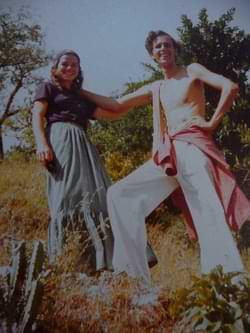
Later, in India, I found someone to hike with.
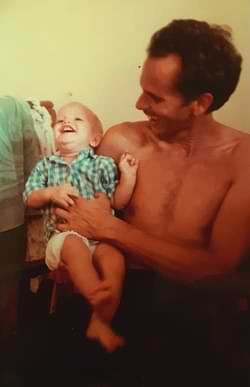
1984: Me with my son, Asher.
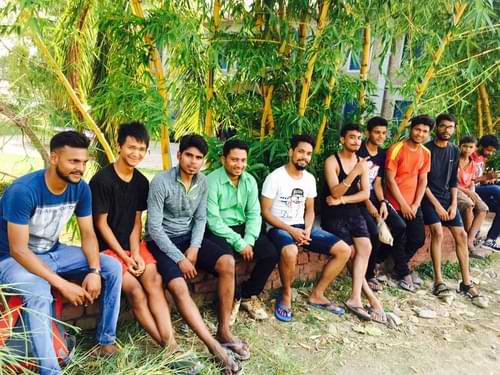
A few of my sons.
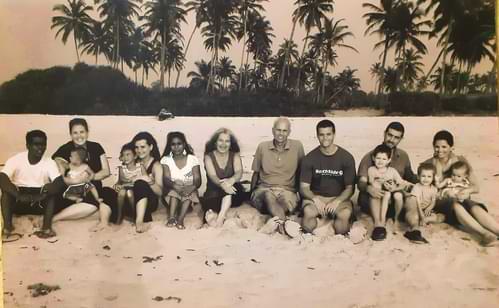
Goa: 2011: Family is growing…
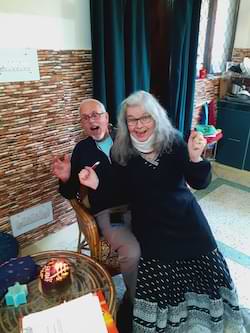
We are now:
5 kids,
11 grandkids,
living in 5 countries. Our birthdays continue.
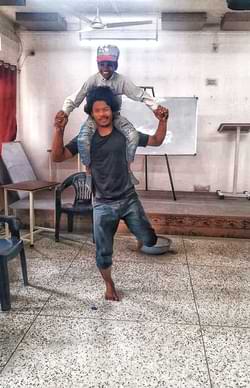
My passion: growing boys into fathers.
One reply on “Searching for Dad”
Great stories Yip! I have enjoyed reading them so much. I knew some parts but you have filled in so many gaps for me. Thanks for sharing.
Knowing God is such and amazing thing, and we are s privileged to have His Spirit to lead and guide us every day.